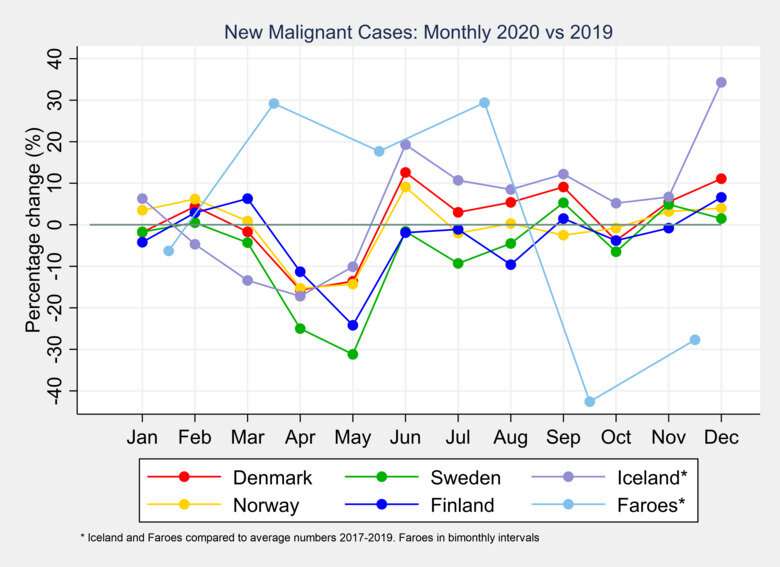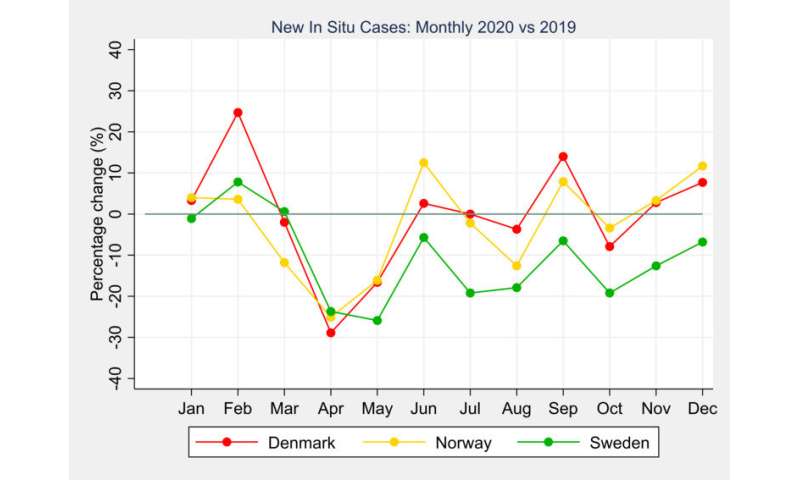
A study from Karolinska Institutet and the Nordic cancer registries shows that cancer notification rates declined in the Nordic countries during the early phase of the COVID-19 pandemic in April–May 2020 compared to previous years. In the fall of 2020, the cancer rates recovered in Denmark, Norway and Iceland, yet only partly in Sweden and Finland. In the Faroe Islands, the changes in cancer rates were not statistically significant. The study was published in International Journal of Cancer.
In this Nordic comparison, researchers from Karolinska Institutet and representatives from each of the Nordic cancer registries have compared rates of cancer notification during 2020 with corresponding reporting in pre-pandemic years. The researchers used high quality data of pathology notifications to the population-based national and regional cancer registries of Denmark, Faroe Islands, Finland, Iceland, Norway and Sweden. These notifications represents the fastest reported data to the cancer registries, and may therefore not entirely correspond to official incidence due to additional, complimentary reporting later.
In all countries except the Faroe Islands, monthly numbers of new malignant cases declined during April-May 2020. The largest decline was observed in Sweden, where the number of new cases in May 2020 were 31% lower compared to the same month in 2019. Significant declines in new malignant cases in April and May was also found in Finland (-24% May), Denmark (-16% April) and Norway (-15% April), while non-significant in Iceland (-17% April). In Denmark, Norway, Sweden and Finland the reporting rates during the second half of 2020 rose to almost the same level as in 2019. However, in Sweden and Finland, the increase did not compensate for the spring decline (annual reduction -6.2% and -3.6%, respectively). The notification patterns for in-situ cases were of similar magnitude. However, for Sweden, lower rates of in-situ cases were also reported in the autumn 2020.
The COVID-19 pandemic led to a decline in rates of reported new cancer cases in the Nordic countries, with the most pronounced reduction in Sweden. Possible explanations include the severity of the pandemic, temporary halting of screening activities and changes in healthcare seeking behavior in the general public. Cancer screening programs were halted in the early phase of the pandemic to varying degree in the Nordic countries, with regional variations and delays also within countries.
Our findings suggest that, despite differences in pandemic mitigation efforts in the Nordic countries, the severity of the pandemic may have had a larger effect on cancer detection than strict societal restrictions.

Continued monitoring of cancer trends are needed
“Our study shows similar patterns of declines in five Nordic countries in April-May 2020, with the strongest decline in Sweden. It is important to note that the early phase of the pandemic was a period of uncertainty which may have affected the general public’s behavior to seek healthcare for cancer symptoms. Screening was halted in some countries, and in those where screening remained open lower attendance rates were still reported in some places,” says first author Anna Johansson, Docent at the Department of Medical Epidemiology and Biostatistics, Karolinska Institutet.
“Importantly, there was a recovery in cancer rates during the autumn of 2020 in all countries, although this recovery did not fully compensate for the spring deficit in Sweden and Finland. There is therefore a need to monitor whether delays in cancer diagnosis will lead to increased rates of late-stage disease. Although there were marked differences in pandemic mitigation efforts in the Nordic countries, our findings show similar overall patterns across countries, especially in the beginning of the pandemic.”
Source: Read Full Article





